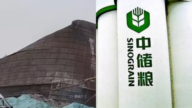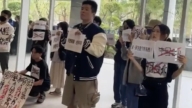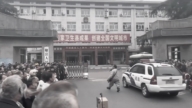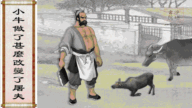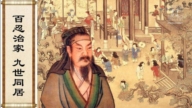【新唐人2011年11月29日訊】大陸2012年度國家公務員考試27號舉行,133萬考生將爭取1萬8千個職位,競爭激烈。值得注意的是,今年的考試特別強調對考生的「品德考察」,瘦肉精、黑作坊等事件都被列入考題。不過民眾擔心這種所謂「德考」會成為另一場「拼爹遊戲」。也有媒體指出,需要品德考察的恰恰是公務員考試本身。
在中國大陸,因為政府公務員福利待遇好,社會地位高,一年一度的國家公務員考試(國考)吸引了越來越多的高學歷人群。在正在進行的2012年度公務員考試中,最熱門職位的競爭比例甚至高達4124:1。
今年的公務員考試在錄用上,要求加強對考生「品德」的考察,考生在大學的平時成績,和老師的畢業點評等,都將列入評分標準。國家公務員局宣稱,考生政治品德不良、社會責任感較差將不得錄用為國家公務員。
對此,大陸民眾孫先生對《新唐人》表示,中共的品德是以共產黨黨綱來定義的,它談的不是做人的倫理道德,更不是孔孟的聖賢道德,服從黨綱品德就好,不服從就不好,所以品德考察沒有一個標準。一般都是把公務員當作一種投資、一種商業模式,在中國買官賣官是很正常的事情。
孫先生:「大多數情況下,要報考公務員體制的話,要過很多層的難關,村裡面的、市裡面的、各種方面的,每個方面都要過這難關。在各種情況下都要疏通關係,都要花不少錢,大多數公務員肯定會利用職務之便,要回他付出的成本,甚至比付出的這成本要大幾倍。」
《四川在線》發表的一篇評論認為,這是給一些特權人士提供的又一個可以暗箱操作的空間。
《濟南日報》評論指出,歷年來,在國考中頻頻出現「拼爹遊戲」、體檢時「被乙肝」、「被不合格」等不公平現象,現在又來個「品德考察」,這很可能為考試不公再次埋下伏筆、再添一道豁口。
也有媒體直言,最需要品德考察的其實是國考本身。
中國反腐敗人士司馬先生表示,公務員招聘每年都是擠破頭,說明這個社會權利高於一切,是個官本位的社會。很多當官的剛進入官場也是想好好做事的,但在現有官場生態下,好官不但做不了事情,還會被排擠。
司馬先生:「好人在官場是做不了事的,官場裡面形成了一個逆向淘汰機制,劣幣驅逐良幣,因為中國官場提拔選拔是由上面那個人決定的。這種體制下,說加強官德加強品德培養,這是一個笑話嘛。」
司馬先生提到,過去有一句話說「做人的優點恰恰是做官的缺點」,他表示,做人要求誠實、要求善良,要求富有同情心,但是這樣的人在官場肯定是頭破血流、寸步難行。
司馬先生:「你不從官僚選拔體制進行改革,那些想法只是欺騙人的動人的言詞,沒有實際效果的。」
《人民日報》一篇評論文章也提到,近年來某些地方在招聘過程中,洩題、作弊、「蘿蔔招聘」等行徑頻頻曝光,引發公眾的不安甚至憤怒,政府的公信力也遭到挑戰。「德考」要成為一道失德者難以逾越的門坎,還須做到可操作、有實效,找到足以服眾的路徑。
新唐人記者周玉林、李庭、肖顏採訪報導。
**************
China’s 2012 national civil service examination was held on
Nov.27, 2011 with 1.33 million candidates competing for 18,000 positions.
It is noteworthy that this year’s exam plays special emphasis
on candidate’s “morality."
Issues of clenbuterol, sweatshops, etc.
were listed among the exam questions.
But people worry that the so-called “morality test" is just
another competition of who’s parents have more power.
Some media pointed out that the civil service test
itself is in need of a morality check.
In Mainland China, civil service jobs have better benefits and
a high social status.
The annual national civil service exam attracts
a growing number of highly educated people.
In the ongoing 2012 civil service examination,
the ratio of people trying out for the top position is as high as 4124 to1.
This year’s civil service examination calls for strengthening
the “morality" of the candidates.
College transcripts and graduation statements from teachers
are included in the scoring criteria.
National Emblem of the PRC announced that candidates with
a bad moral character and poor sense of social responsibility will not be employed as civil servants.
In this regard, Mr. Sun from China told NTD that the
Chinese Communist Party (CCP)’s moral standard is defined by the Community Party principle,
which is not about the being ethical and moral,
and not in accordance with Confucianism.
It is about obedience to CCP principles.
So there is no moral standard.
In China working in the civil service is treated as an
investment;
a business model where buying and selling one’s position
is the norm.
Mr. Sun: “In most cases, one has to bypass many layers of
barriers to apply for the civil service exam,
the village level, the city level, in every aspect of has to
bypass a barrier.
At each level, if one wants to break through the barriers
it’s a matter of who you know and how much money you want to spend making bribes.
Most civil servants will certainly use their positions to get the
investment returned, and to make even further profit. ”
Sichuan.scol.com.cn published an article stating that this
provides more space for those in power to conduct operations “behind closed doors”.
Jinan Daily has a commentary article, stating that these types
of “competitions of who’s parents have more power” have appeared each year during the national civil exams.
Also, during the physical exams, many candidates were
“diagnosed with Hepatitis B,” or “not qualified.”
This new “morality test” is very likely another
way to further corrupt the exam.
Some media stated directly that exam process itself
needs a morality test.
China’s anti-corruption activist Mr. Sima expressed that
the recruiting process of civil servants is highly competitive.
This shows that power is placed above anything
else in this society.
Many officials also wanted to do good deeds at the beginning,
but in this system, not only can they not do good deeds, but they are also eliminated from these positions.
Mr. Sima: “Good people cannot do anything good.
The official circle has a reverse trend of elimination.
Bad people get rid of good people.
The selection and promotion process is decided by those above.
To talk about strengthening morality in this kind of system
is a joke.”
Mr. Sima mentioned an old saying, “the good qualities of a
person are shortcomings of an official.”
Honesty, kindness and compassion are good qualities of a man,
but such a person will for sure fail in the world of officials.
Mr. Sima: “Without reform to the selection process,
it is only a pleasant statement with no real impact.”
People’s Daily published a commentary article about
frequent exposures of revealing exam questions,
cheating and hiring friends and relatives during the national
civic service recruiting process in some areas in recent years,
which led to public unrest and even anger.
The government’s credibility has also been challenged.
In order for the so-called “morality test” to be considered an
truly rigorous test of morality, the process must be operational, effective, and convincing to the public.
NTD reporters Zhou Yulin, Li Ting and Xiao Yan


